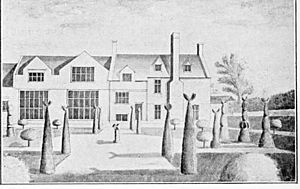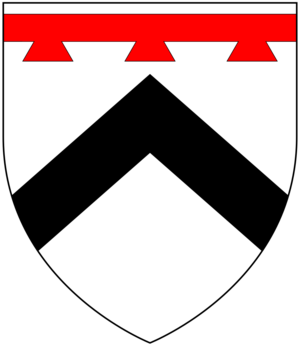Sir Edmund Prideaux, 4th Baronet facts for kids
Sir Edmund Prideaux, 4th Baronet (born 1647, died 1720) was an important person in British history. He lived at Netherton, Farway and worked as a lawyer. He was also a politician, which means he helped make laws for the country. Sir Edmund was a member of the House of Commons from 1713 until he passed away in 1720.
Contents
Sir Edmund Prideaux's Life
Early Life and Family
Sir Edmund Prideaux was born on April 4, 1647. He was the oldest son of Sir Peter Prideaux, 3rd Baronet, who also lived at Netherton. His mother was Elizabeth Granville. Her father was Sir Bevil Granville from Cornwall.
When he was 16, in 1663, Edmund went to Oriel College, Oxford University. Later, in 1667, he joined Inner Temple. This was a special place where people studied to become lawyers. By 1680, he officially became a lawyer.
Sir Edmund was married three times. His first wife was Susanna Austin. They married in 1673 and had two sons and one daughter. Sadly, Susanna passed away in 1687. Around 1695, he married Elizabeth Saunderson. They had one son together. Elizabeth died in 1702. In 1705, Sir Edmund became the 4th Baronet after his father passed away. His third wife was Mary Rogers, whom he married in 1710. They did not have any children.
A Career in Law and Politics
Sir Edmund Prideaux held several important jobs in his life. From 1699 to 1700, he was the High Sheriff of Cornwall. This role meant he was the chief law enforcement officer in the county.
By 1701, he became a Deputy Lieutenant for Cornwall. This was a position that helped the main Lieutenant of the county. This role was confirmed again when Queen Anne became queen. Later, in 1708 or 1709, he joined the "commission of the peace" in Devon. This meant he was a local judge, helping to keep law and order.
He was also a "stannator" of Blackmore in 1710. A stannator was a representative for tin miners in Cornwall. In 1713, he became a justice in Cornwall. This was another role as a judge.

Sir Edmund had a strong influence in the town of Tregony. He supported the local church leader there, who had a big say in elections. Because of this, Sir Edmund was elected as a Member of Parliament for Tregony in the 1713 general election. This meant he represented the people of Tregony in the House of Commons.
In 1714, his role as a Deputy Lieutenant in Cornwall was renewed. He was re-elected to Parliament in the 1715 general election. He usually supported the Whig government, which was one of the main political groups at the time. However, he did not support the "Peerage Bill" in 1719. This was a proposed law about who could become a peer (a member of the nobility).
Later Life and Passing
Sir Edmund Prideaux passed away on February 6, 1720. He was buried in Great Stanmore. His oldest son, also named Edmund, took over his family's estates and title.
 | Laphonza Butler |
 | Daisy Bates |
 | Elizabeth Piper Ensley |


